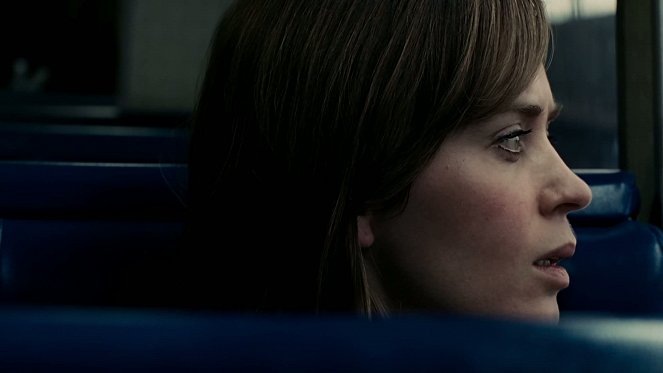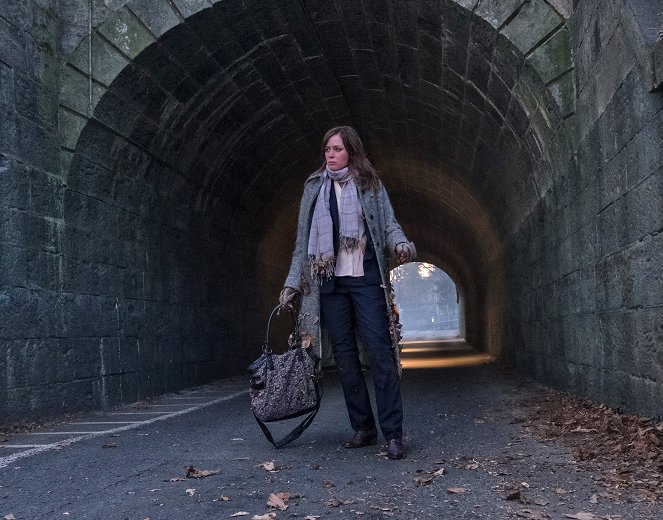Regie:
Tate TaylorDrehbuch:
Erin Cressida WilsonKamera:
Charlotte Bruus ChristensenMusik:
Danny ElfmanBesetzung:
Emily Blunt, Rebecca Ferguson, Haley Bennett, Justin Theroux, Luke Evans, Edgar Ramirez, Allison Janney, Lisa Kudrow, Laura Prepon, Marko Caka (mehr)Streaming (4)
Inhalte(1)
Rachel Watson pendelt täglich mit dem Zug nach Manhattan. Jedes Mal fährt sie bei dem Haus ihres Ex-Mannes Tom vorbei, in dem dieser nun mit seiner neuen Frau Anna und dem gemeinsamen Baby wohnt. Auch das Nachbarhaus hat sie immer im Auge, und träumt sich in das glückliche Leben ihres Traumpaares, Megan und Scott. Als sie Megan mit einem anderen Mann sieht, ist sie zutiefst erschüttert und verlässt an der nächsten Station den Zug. Am nächsten Morgen erwacht Rachel blutverschmiert, kann sich aber an nichts mehr erinnern. Und Megan ist plötzlich spurlos verschwunden. (ORF)
(mehr)Videos (30)
Kritiken (13)
(UCI Kinowelt, Potsdam, Deutschland, 2.11.2016) Auf den ersten Blick erinnert Girl on the Train an den Vorjahresfilm Gone Girl - Das perfekte Opfer - es geht um zwischenmenschliche Beziehungen, die extrem dysfunktional sind. Emily Blunt hat die Rolle der aufmerksamen und traurigen Alkoholikerin, die sich an ihre Vergangenheit klammert, wirklich gut gespielt. Ihre Darstellung war wirklich überzeugend, ebenso wie die Atmosphäre und die rohe Authentizität einiger Szenen. Allerdings fehlt im Vergleich zu Gone Girl der WOW-Effekt am Ende, der einem einen Schauer über den Rücken jagt, da hätten die Macher noch mehr rausholen können. Außerdem war mir nach etwa der Hälfte des Films klar, wer für das Verbrechen verantwortlich ist. Kurzum, ein Film mit sichtbarem Potenzial, das nicht voll ausgeschöpft wurde.
()
Ich fürchte, dass das ganze Phänomen von Girl on the Train viel interessanter ist als der Thriller selbst. Das Ergebnis ist jedoch ein gutes Frauendrama, das zeigt, dass es durch eine weibliche Brille betrachtet wird. Nun ja, warum nicht. Eigentlich hipp, hipp, hurra. Aber der ganze PR-Hype verkauft leider etwas ganz anderes, fast einen Horrorfilm über eine labile, geheimnisvolle Frau, die vielleicht im Mondschein in einem Zug ein paar Verbrechen begeht oder so. Es wäre eine Analyse wert, ob das Produkt selbst nicht so gut ist oder ob die Werbeagentur einfach nicht glaubt, dass sie ihr Projekt ohne Manipulation an einen Empfänger verkaufen kann, der das Thema/Genre/was auch immer schätzt. Ich finde, verfehlt seinen Zweck, und das ist sehr schade.
()
Eine schöne formale Seite vernebelt erfolgreich das verborgene Geheimnis der Geschichte. Auf die Schauspieler*innen ist auch ein schöner Anblick. Wenn aber das Geheimnis enthüllt wird, wird aus dem Film nur ein gewöhnlicher Thriller ohne jegliche Invention, den man in den Kinos nur wegen der populären Buchvorlage besucht. Und wegen Fincher.
()
Ein Film im Sinne eines Misery-Pornos mit didaktischer Regie sowie einem komisch transparenten Drehbuch, bei welchem man den Mörder bereits nach etwa zwanzig Minuten erahnt. Also bleibt uns nichts anderes übrig, als die Überspielung sämtlicher Beteiligten zu genießen, mitsamt der niedlich gewollten Düsterheit sowie der Exploatationsendung, die in den Händen eines fähigeren Regisseurs hätte provokativ klingen könnten. Es ist so eine Art Německo Gone Girl - Das perfekte Opfer für Haushaltsmuttis und eine Möchtegern-psychologische Sonde einer Beziehungsmiserie. Als Thriller also nicht, jedoch als ungewollt kitschiger Chick Flick Streifen aus einer Bibliothek mit sehr roten Laternen? Na ja.
()
Just as when reading the novel on which The Girl on the Train is based, it is impossible to avoid comparisons with Gone Girl. Both films have noirish, bleak visual stylisation (in Fincher's case, that’s the director’s signature; in Taylor’s, it’s rather an imitation), both depict marriage as a life-threatening game filled with manipulation, lies and hypocrisies (with a cynical sense of detachment and ironic distance from the characters in Gone Girl, but in all seriousness in The Girl on the Train), and both films alternate between multiple narrators (with greater sophistication in Gone Girl). Compared to the slightly misogynistic Gone Girl, The Girl on the Train is more explicitly targeted at adult female viewers, who are encouraged through Rachel’s story to rely on themselves rather than on what they are told or what others want for them. Especially men. ___ As in the book, the final reversal of the roles of victim and offender is a tribute to the emphatic pro-woman cri de coeur, which greatly degrades the impact and sheds doubt on the meaning of the film’s portrayal of an alcoholic woman. Built more on strong acting performances than on narrative games, the film is largely conceived not as a crime thriller, but as a psychological study of an internally insecure woman in search of her lost (self-)confidence. The ending, which unlike the book contains a needless epilogue, suddenly negates this feeling of shame and guilt, intensified by the excellent Emily Blunt throughout the film. As in many of Hitchcock’s thrillers involving the transfer of guilt, the perpetrator was someone other than the film had previously indicated, which in this case, however, serves to resolve only the crime aspect of the narrative, but not the psychological dimension, which comes off as unsatisfying. ___ Thanks to the graphic continuity of the shots and precisely timed editing, Taylor succeeds in fostering the impression of fluidity and interconnectedness of the individual segments of the narrative, or rather of the individual narrators. Flashbacks showing various distant episodes from Megan’s life intensify the suspense with respect to what actually happened. Like Rachel, with her memory affected by sipping vodka, we know only fragments of reality and we have to continually add to and adjust the overall picture on the basis of new information. Like the protagonist, we also mistakenly infer who we are seeing in some of the images based on the available context. The unreliable narrative thus does not serve as the screenwriter’s calculated attempt to deceive the viewer, but is organically connected with the protagonist’s mental state and cognitive abilities. As a result, The Girl on the Train is a compact and focused film, most of whose shortcomings (the mishandled ending, lack of detachment, occasionally melodramatically forced sense of tragedy) stem from the book’s premise or are associated with the audience’s expectations (it’s not a thriller, but a drama). If you see romantic relationships as a cynical comedy that sometimes bring a smile to your face, Gone Girl will probably remain your favourite relationship movie. If you prefer a more tragic approach, The Girl on the Train may suit you better. 80%
()
(weniger)
(mehr)



Werbung